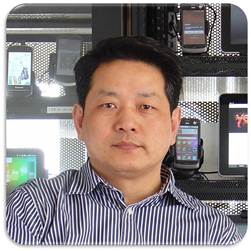Interview With WangJun -- iTestin App, Windows Azure Accelerator in China
Here is part two of the series on startups coming out of some incubators in three countries -- China, India, and Israel. We sat down with WangJun of iTestin App, an app that helps developers test their code simultaneously while building it. I thought that the environment of the Testin office was really interesting and worth noting, so here are some notes from that visit.
The office has around 20 people, each stationed at a desk with a desktop computer. Most of the screens are filled with code – lines and lines of script that I took a look at and thought was gibberish. But they were so intently studying those lines, occasionally making selections/edits. Also, there were gadgets every which way you looked: phones, tablets from all sorts of different manufacturers. The interview took place in the back office, with devices of all sorts. Different sounds filled the air throughout our interview – some familiar, like those from Fruit Ninja, an online game popular in China.
WangJun took it all in stride and didn’t seem to notice the ringing/music coming from the devices on his shelves. He carried on the conversation as though he hadn’t heard anything. Everyone was so focused and determined.
BizSpark: How do you know when you are failing in product development and how to you make a correction – do you make the decision on your own, or do you consult your team?
WangJun: We’ve figured out our product, and it wasn’t by our team’s collaboration alone. I’d say about 70% of our product was drive by our customers and partners. At the end of last year, we created a product that allowed developers to control the cloud. The problem was, the bandwidth for each device was too big. The cost for bandwidth was too high for developers and operators. Customers also thought that it was too complicated to use our device. Our solution, based off of our customer feedback, was to stick with the idea of Testin – to enable remote app testing across many devices. We didn’t need a hi-fi show – we just needed to provide our customers with the information they needed, that is, the reports of the results of their app testing. Friendship with customers and a relationship where they can tell you what they need and what they like/don’t like is important. I’m just a teenager when it comes to startups; I know I have a lot to learn, and I’m learning a lot from my customers.
BizSpark: Who is your mentor, and what was the last great thing he or she told you and your team?
WangJun: Jiang Xiao Hai:he was the founder of PICA, a company I used to work for. Although he eventually ended up selling PICA for $90 million, he called the business a failure. PICA could not provide services to customers directly; a lot of outsourcing was involved. It was a product-driven company; every year, they would have to push their customers to purchase instead of catering to their customer’s needs and putting the focus on them. Jiang Xiao Hai has taught me a lot about what makes a business successful. It’s not quick money that makes for a great company – it’s the sustainability of great results. You need to focus on the long term business model, a model that is sustained by great customer and company relations, not the company itself.
BizSpark: What has overjoyed you in this past month?
WangJun: During the Microsoft Accelerator for Windows Azure launch two weekends ago, all the CEOs put their wishes into the time capsule. Part of my wish was to have the opportunity work with Microsoft. We can provide solutions to Windows Phone developers. This potential partnership is my encouragement; it drives me to get up in the morning. Also, the prospect of breaking into the global ecosystem gets me excited as well. If you do business purely for the china market, it’s too small in relation to a global sense. We have a big dream. Currently, we are only capable of handling Chinese apps, but we expect to be able to have support the English version of our product in the fall.
BizSpark: Who inspired you the most this week, and why?
WangJun: On Monday, I had a meeting with a big company – a CPU vendor (name and company undisclosed). They expressed an interest in our solution. Right now, they use real human testers, each of whom can test at most 50 aps a day. When they asked me what my performance level was, I answered “at last 300 and at most 1,200.” Developers can’t afford human testers – it would cost them $10 million, whereas if they used Testin, they would only have to spend $60,000. Over the past 72 hours, I’ve been reveling in this elation – they told me I couldn’t do it, but in actuality, I can. I was so glad and also inspired for future opportunities. The global market is our goal, and I feel like we are taking big steps in the right direction.
